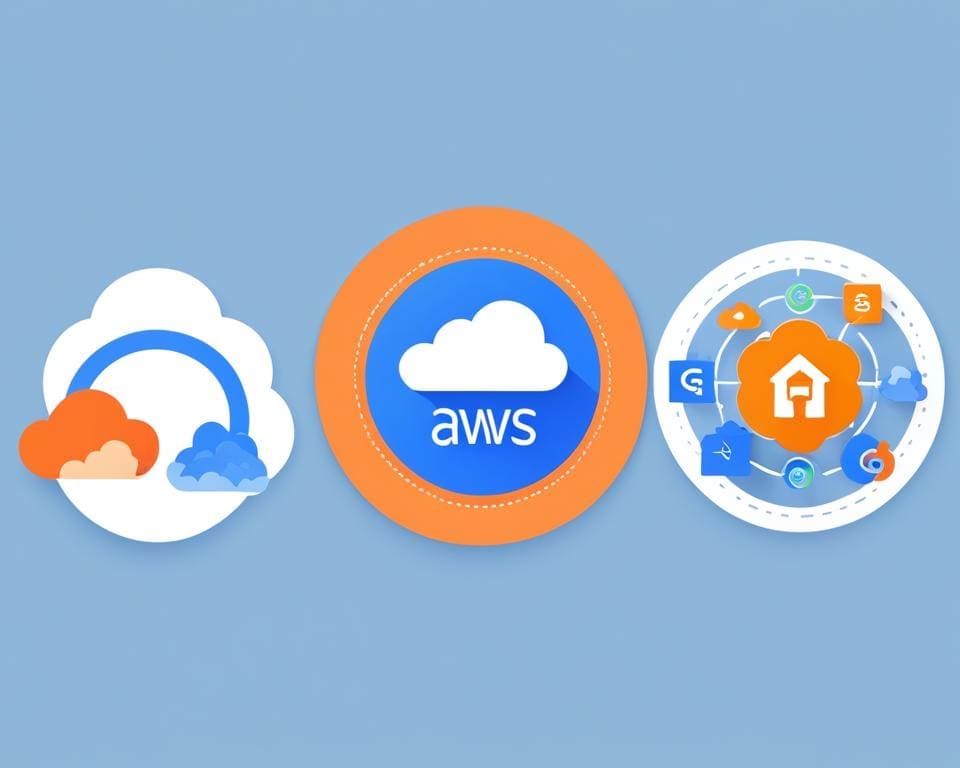The battle between Google Cloud and AWS is a key topic in cloud computing. These platforms offer a wide range of services to meet different business needs. Since their launch in 2006 and 2008, AWS and Google Cloud have grown a lot. They now offer powerful solutions that help businesses scale, save costs, and use advanced features.
This piece helps businesses pick the right cloud. Google Cloud vs. AWS shows that Google Cloud has the edge in services like Kubernetes and BigQuery. Google Cloud’s Migration Center also makes moving from AWS easy. This helps businesses switch without losing performance.
We will look into what these clouds offer, their performance, and costs. This will help businesses understand which to choose. As cloud computing changes, knowing these differences is vital for tech and business goals.
Understanding Google Cloud and AWS
The cloud computing world is dominated by Google Cloud Platform and Amazon Web Services. They offer distinct features for different business needs. We will explore what makes each service unique and powerful.
Overview of Google Cloud Platform (GCP)
Google Cloud Platform is known for its strong services. These are the same technologies that power Google Search and YouTube. Its main features include:
- Computing power for various tasks.
- Storage options for handling data.
- Networking solutions to stay connected.
- Tools for Big Data and machine learning.
- Security measures to protect data.
Businesses can control costs with its pay-as-you-go approach. GCP is great at processing big data, ideal for analytics-focused companies. It integrates well with other Google services, benefiting startups and developers.
Overview of Amazon Web Services (AWS)
Amazon Web Services is a top name in cloud services. Since starting, it has grown to serve both small startups and big enterprises. AWS offers:
- Various computing and storage solutions.
- Networking options for solid connections.
- Big Data and machine learning tools.
- Resources for scaling and growing easily.
- A wide range of development tools.
AWS stands out with its diverse services. It has over 200 data centres worldwide, ensuring reliable service in many regions. Comparing Google and Amazon Cloud shows AWS’s dedication to staying ahead, making it a strong choice for full cloud solutions.

Google Cloud vs. AWS: Which Cloud is Better?
The battle for cloud supremacy is fierce, particularly between Google Cloud Platform (GCP) and Amazon Web Services (AWS). They both bring unique services to the table, catering to different business requirements.
Service Offerings and Flexibility
AWS leads with over 200 services covering infrastructure, platform, and software needs. Google Cloud focuses on niche areas like big data and machine learning. It showcases innovation with tools such as Google App Engine and Google Compute Engine.
In the debate over Cloud platform comparison Google vs. AWS, each adapts to meet various needs. Google outshines with its advanced tool, BigQuery, known for its fast data processing. This allows businesses to tailor their services to meet their goals perfectly.
Performance and Scalability
Discussing Google Cloud vs. AWS performance differences, both platforms excel in performance and scalability. AWS has a broad network of data centres, ensuring low latency and high availability. This global reach is crucial for businesses needing dependable performance everywhere.
Google Cloud, however, is particularly impressive in speed and scalability, perfect for data analytics and machine learning. Its ability to efficiently scale supports businesses’ growth, making it ideal for tech startups and companies facing rapid changes.
Cost Analysis: Google Cloud vs AWS Pricing Comparison
When choosing cloud services, it’s vital to compare costs. Looking at Google Cloud and AWS, we see differences in their pricing. This affects how businesses manage their funds.
Understanding Pricing Models
Google Cloud Platform (GCP) and Amazon Web Services (AWS) both offer flexible payment options. GCP saves you money with Sustained Use Discounts, perfect for constant usage. AWS has hourly rates which may cause unexpected expenses.
Google’s E2 machines are about 30% cheaper than AWS’s m5 machines. For database needs, Google Cloud SQL is more cost-effective than AWS’s RDS. This is thanks to the 3-year Committed Use Discounts.
Cost-Effectiveness for Startups
Startups must understand Google Cloud versus AWS for cost-saving. Google Cloud helps new businesses with incentives. A $300 billing credit for new users supports early development stages.
AWS offers many services and a free tier for some. However, it can be expensive at first. GCP’s simpler pricing helps with budgeting. Making the right pricing choice is crucial for startup growth.
Security Features and Compliance
In the cloud computing world, security is top priority for companies moving to the cloud. Google Cloud and AWS have strong security frameworks. Google Cloud’s security shines with its clear Shared Responsibility Model. It shows who does what in security, letting businesses know their part while enjoying top-notch security services.
AWS takes a simpler route with its Shared Responsibility Model. It puts more security work on its customers but handles the cloud’s security itself. Both keep upping their security game and meet rules like GDPR and PCI DSS. Google Cloud has a Security Command Center for watching over assets in real time. AWS uses GuardDuty to spot threats and keep data safe. They work hard to protect sensitive info and follow international standards.
Both AWS and Google Cloud have many security tools and certifications to help businesses shape their security plans. Services range from managing secrets to stopping DDOS attacks, offering strong ways to lower risks. By looking closely at these security options, companies can choose their cloud service wisely. This ensures security and compliance stay central to their strategy.








